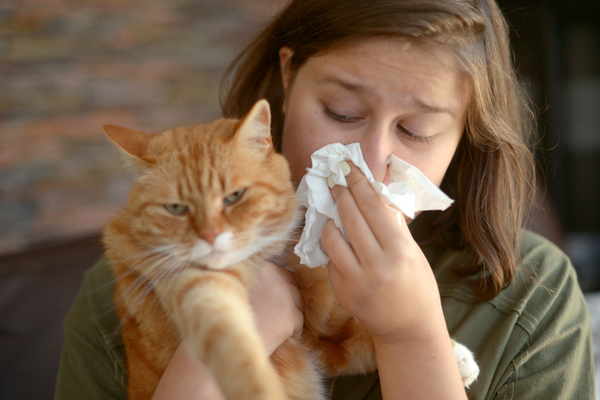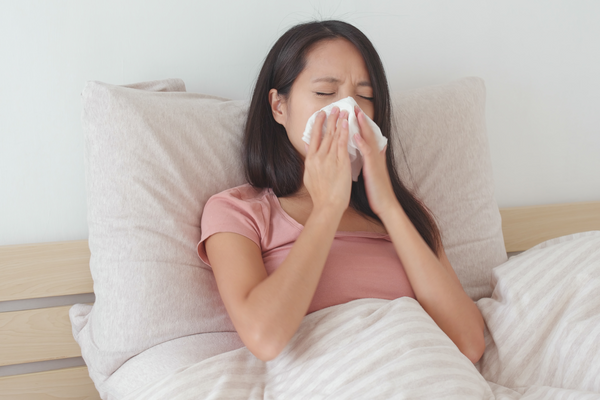3 Healthy Ways to Think & Talk About Cleaning

We all know that cleaning is essential for keeping our homes healthy and free from germs, allergens, and other irritants. But more than that, our homes can be incredibly important tools for shaping our daily experiences, and for many, the state of their home environment can directly impact how they feel. But as beneficial as a clean, tidy home can be for overall well-being, it’s impossible to truly relax and enjoy your home if you hold onto unrealistic expectations.
Reframing how you think and talk about caring for your home environment is the first step to a healthier way of living––one that can help decrease stress and ultimately motivate you to make changes that you actually want to make. Here are three simple changes you can make regarding how you think and talk about cleaning.
1. Set Specific, Attainable Goals
If you find yourself short on time and overwhelmed with cleaning tasks, try reframing your goals. Rather than saying, “I’m going to clean the kitchen,” try deciding upon a few manageable tasks that you can tackle in a set amount of time. For example, “I’m going to put away the dishes and clean the countertops.”
By having a defined goal, such as refreshing the kitchen by putting away the dishes and cleaning the countertops, you’re taking the ambiguity away from the cleaning task.
After all, a simple phrase like “cleaning the kitchen” might include tasks like cleaning out the refrigerator, scrubbing the oven, decluttering the cupboard, scouring the sink, or sweeping the floors. Without setting specific goals, you may start your cleaning regimen by putting away the dishes and cleaning the countertops, but somehow find yourself cleaning for hours (it happens to the best of us!), and before you know it, your kitchen is turned upside down. Or, on the other hand, you may become so overwhelmed with the magnitude of the task that you don’t start at all.
2. Let Go of the Need for Perfection
Even before Instagram hit its peak and unattainably clean, flawlessly decorated homes became a finger flick away on the tiny computers in our back pockets, many of us were obsessed with the idea of a “perfect” home. And letting go of perfectionism when it comes to cleanliness can be difficult, especially in this day and digital age. However, try to keep in mind that a restorative, relaxing home is defined by how you feel inside of it. Constantly feeling pressured to keep every inch of your home sparkling clean and tidy can be exhausting. And when you believe that a mess is “bad” and clean is “good,” you set yourself up for a whole lot of shame and guilt when you can’t keep your home mess-free.
Instead, try setting boundaries and reasonable expectations for yourself and your home environment. A personalized and manageable cleaning schedule can do wonders for mental health and help you crush your cleaning goals.
3. Learn to Think of Cleaning as Self-Care
When you’re watering or pruning your cherished houseplants, it’s unlikely that you say you’re doing “plant chores.” Instead, you’re “caring for your plants”; you’re helping them to thrive. Now, if you’re having trouble getting motivated to keep things clean and tidy around your home, try reframing those tasks as self-care opportunities rather than simply items on a to-do list.
Not quite convinced that cleaning is an important aspect of self-care? Keeping your space clean and organized is good for you, and science can prove it.
In a 2010 study published in the scientific journal Personality and Social Psychology Bulletin, researchers at the University of California-Los Angeles asked working families to film self-guided tours of their homes. Participants who dwelled on things that needed fixing—such as “unfinished projects,” “repairs,” or “cluttered” areas—had weaker recovery of cortisol, the body’s stress hormone, at the end of the day compared to those who described their homes as “restful” and “relaxing.” Interestingly, this finding did not apply to the men in the study, only the women, who historically “have been socialized to feel more responsible for the upkeep of the home, even in a partnered relationship,” says Darby Saxbe, Ph.D., the study’s lead author and director of Dornsife Center for the Changing Family at the University of Southern California.
In 2011, researchers at Princeton University found that clutter can actually make it more challenging to focus on a particular task. Specifically, the researchers found that the visual cortex can be overwhelmed by task-irrelevant objects, making it harder to give attention and complete tasks efficiently.
Another recent survey conducted by the National Sleep Foundation found that people who make their beds every morning are 19% more likely to report regularly getting a good night’s sleep. People who were surveyed also reported benefits from having clean sheets. Specifically, 75% of people said they get a better night’s rest when their sheets are freshly cleaned because they feel more comfortable.
The bottom line: While chores are obligations, self-care tasks are acts of kindness that help you care for yourself and your home environment. Shifting how you think about cleaning will help remove some external stress and make completing tasks more manageable. Above all else, remember to be kind to yourself!
Final Thoughts
At The Ecology Works, we take cleaning seriously, and we believe that cleaning is a necessary form of self-care. We also care deeply for our customers and our magnificent planet, which is why we constantly strive to make our products more sustainable. From the 100% biodegradable formulas of our Anti-Allergen Laundry Detergent and Anti-Allergen Solution to our VOC-free disinfectant cleaner Vital Oxide, and the 100% solar-powered manufacturing plant that produces our Anti-Allergen Pet Shampoo in recycled PET bottles; every product we make comes with the promise that we are actively working toward environmentally-sound products.





